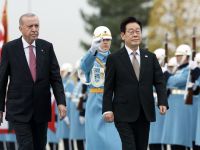Indonesian Foreign Minister Hassan Wirajuda warned Sunday of an "explosive" reaction in the Islamic world if US strikes against Afghanistan continue into the Muslim fasting month starting mid-November.
"From our own perspective, Ramadan is coming in the next three weeks or so, starting on the 17th (November)," he told reporters after the Asia-Pacific Economic Cooperation (APEC) summit in Shanghai.
"Ramadan is important for Muslims to reflect and express solidarity, so those who suffer emotionally, it will be, I think, explosive if... the military actions are still being done in Afghanistan," Wirajuda said.
The reaction would be felt "not only (in) Indonesia but other Muslim countries as well", he warned.
"For countries with large Muslim populations like Malaysia, Indonesia, Pakistan, Saudi Arabia and Bangladesh, prolonged military conflict in Afghanistan will have an effect of destabilising these countries."
There have been near daily protests in several cities in Indonesia, the world's most populous Muslim nation, since the US launched its campaign against Taliban-ruled Afghanistan on October 7.
President Megawati Sukarnoputri, in an apparent attempt to appease Muslims angry at civilian casualties in Afghanistan, last Sunday indirectly criticised the attacks. Her vice president, Hamzah Haz, has called for them to stop.
Megawati and US President George W. Bush were both attending the two-day APEC summit that ended Sunday. They did not hold a separate bilateral meeting on the sidelines, with Megawati having just recently visited Washington.
The foreign minister said the government was guaranteeing security in Indonesia with heavy deployments of troops and police in Jakarta alone.
"We want to be a good host so that all the foreigners will be safe," he said, amid threats against Westerners by some Indonesian extremists.
"The expression by some groups of a radical thinking is a minority. Most Indonesians are moderate Muslims," Wirajuda said.
Indonesian police have been getting tougher with the anti-US protesters, making several arrests and attempting to charge at least one hardline Islamic leader.
Wirajuda reiterated calls by Indonesia, which have been backed by Russia, China and Malaysia, for the United Nations to coordinate the US-led war on terrorism.
Commenting on the start of US ground operations in Afghanistan, he said: "Our preference is for collective action by the United Nations rather than unilateral action by the United States and its alliance.
"We are concerned about growing (Afghan) civilian casualties in terms of the increasing flow of refugees," he said.
The APEC leaders, including Malaysian Prime Minister Mahathir Mohamad, issued an anti-terrorism statement at the conclusion of their summit which condemned the September 11 atrocities as "murderous deeds".
While opposing the US retaliation for the strikes on New York and Washington, Malaysia and Indonesia both signed up to the APEC statement's broader pledges to hunt down terrorism and for the UN to play "a major role".
"Indonesia strongly condemns terrorism, because of our beliefs," the foreign minister said.
"Indonesia, being the largest Muslim country, is against terrorism because this is against Islamic teachings, which preach peace" -- Shanghai, (AFP)
© 2001 Al Bawaba (www.albawaba.com)







